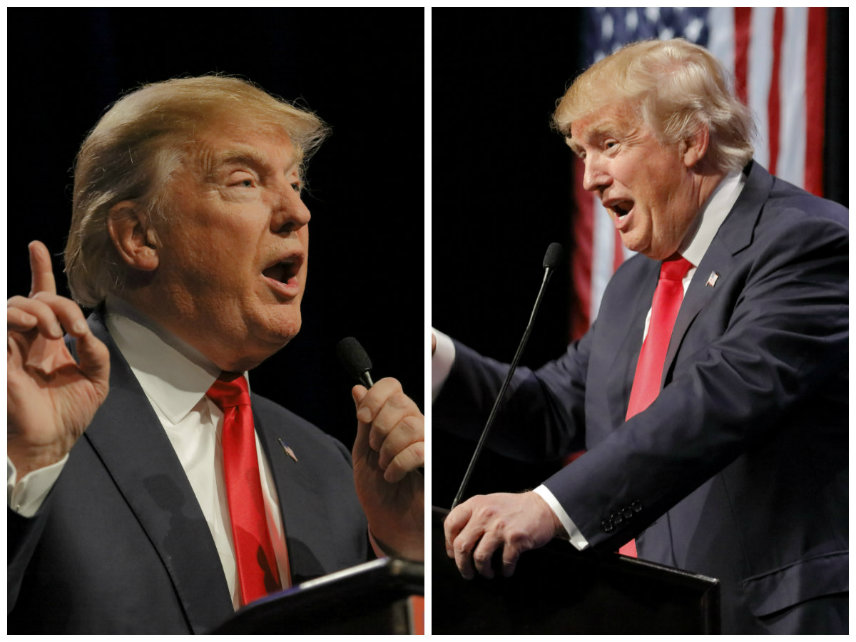Do Trump's Tariffs Actually Exist? Donald Trump Debates Donald Trump.
Trump suggests the tariffs are a fiction invented by CEOs, using the president as a scapegoat. But maybe he has a point?

Do the tariffs imposed by the Trump administration actually exist? Many people are saying that they do—and that, in fact, they are the greatest tariffs ever—but some are now disputing that claim.
One of the loudest voices to emerge recently from the tariffs-are-not-real camp is President Donald Trump himself.
"We don't have any tariffs," Trump told four reporters from The Wall Street Journal during an interview conducted Tuesday in the Oval Office. "I didn't put tariffs. Where do we have tariffs? We don't have tariffs anywhere."
This is a potentially earth-shattering revelation. Just this week, for example, more than one-third of the companies in the S&P 500 have cited the Trump administration's tariffs in third quarter earnings reports and calls with investors. Trump's argument that the tariffs do not actually exist raises some major questions about whether those businesses—including major American companies like Ford, Caterpillar, Harley-Davidson, and more—are being honest with investors and the American public.
But why would all those companies lie about the consequences—nay, the very existence—of the tariffs? Could the tariffs be a collective hallucination on the part of dozens of corporate executives? Or, worse, perhaps nothing more than an elaborate plot to sell T-shirts?
Trump suggests one possible answer.
"A business that's doing badly always likes to blame Trump and the tariffs because it's a good excuse for some incompetent guy that's making $25 million a year," he told The Wall Street Journal.
To get to the bottom of the question of whether the Trump administration's tariffs are real or not, we must turn to the man in charge of the Trump administration's trade policies: President Donald Trump.
On Tuesday, just hours before Trump sat down with the Journal's reporters, Trump tweeted about the tariffs.
Billions of dollars are, and will be, coming into United States coffers because of Tariffs. Great also for negotiations - if a country won't give us a fair Trade Deal, we will institute Tariffs on them. Used or not, jobs and businesses will be created. U.S. respected again!
— Donald J. Trump (@realDonaldTrump) October 23, 2018
That should be taken as strong evidence that the tariffs are real. But wait, there's more. Trump has tweeted that the "tariffs are working big time" and that the tariffs will increase the price of Apple products, like iPhones, that are assembled in China (though it remains unclear if that's what he meant by the tariffs "working"). At press conferences and political rallies, Trump has bragged about imposing tariffs and has routinely threatened to add imported cars to the list of items subject to tariffs.
It is clear, then, that the tariffs are real. It is also clear that Trump lies about them without any apparent strategy, conscience, or consistency.
For example, Trump has claimed that his tariffs are causing American steelmakers to open new plants—but the number he's cited has changed from six to seven to eight, when in fact, zero new steel plants have opened in the U.S. since March, when the tariffs on imported steel supposedly began. U.S. Steel has expanded operations at two existing facilities, but it is not a stretch to claim it has opened new plants, it is a lie.
Trump has also claimed that the tariffs are having "no impact on our economy," despite the fact that he's also touted the effects of tariffs, like the supposed opening of new steel plants (which, again, has not happened), and the supposed increase in the price of Apple products.
The shifting explanations, contradictory claims, and inability to offer rational explanations suggest that Trump continues to think about tariffs the way another person may believe that Elvis is still alive and living under a different name: because he just does. To wit, Trump once offered that very same explanation to Gary Cohn, then the White House's top economic adviser, according to a passage from Pulitzer-winning reporter Bob Woodward's latest book, Fear:
"Why do you have these views [on trade]?" Cohn asked Trump.
"I just do," Trump reportedly replied. "I've had these views for 30 years."
The more I think about Trump's argument that his tariffs are not real, the more I think he believes it. Real tariffs could not do all the things Trump says his tariffs can do, have done, and will do in the future.
While that explanation may reflect Trump's magical thinking, it doesn't reflect reality. The White House has issued official statements announcing tariffs. The Office of the U.S. Trade Representative has held days of hearings, filled with heartwrenching testimony from American businessmen and businesswomen who practically begged the government not to impose higher taxes on the products they must import in order to build everything from lawnmowers to baking ovens. The U.S. Treasury has collected more than $1 billion in tariffs from American businesses that purchased foreign steel and aluminum. Literally hundreds of American companies have reported being harmed by the tariffs. The existence of the tariffs may be up for debate within Trump's mind, but they are very real to every other human being participating in the global economy.
In the end, there are only two options: Either Donald Trump is lying, or Donald Trump is lying.


Show Comments (143)